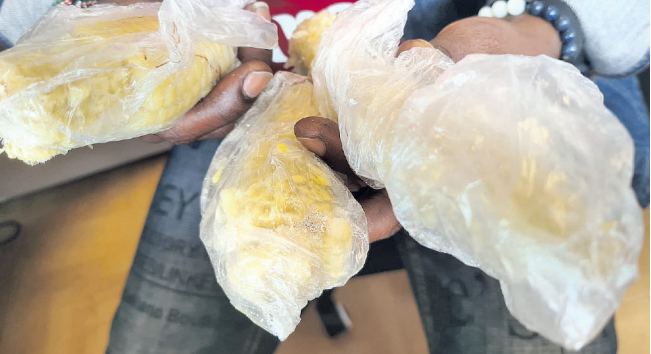

Despite the ban on single-use plastic bags, some traders have found a way of sneaking them into Nairobi, contributing to the poor drainage system.
Experts say mismanagement of waste has contributed to the perennial problem. A visit to markets in Kangemi Kawangware, Eastleigh, Kayole and other informal dwellings shows the plastic bags are still in use.
Waithira Mwangi, a milk seller at Kangemi market says she cannot turn away a customer just because he or she did not come with a container.
“I know it is illegal and that’s why I don’t do it openly. I encourage my customers to come with a bottle or a jug to carry milk but if someone does not have a container, then I use a polythene bag,” she says.
Geoffrey Mbula, a hawker at Burma market, says he mainly uses the approved carrier bags but seldom uses single-use plastic bags to package eggs. He says the single-use materials are still available in the black market.
“Because they are illegal, they are very cheap. I don’t use them for I know their effect on the environment,” Mbula says.
In May 2023, Governor Johnson Sakaja promised to crack down on illegal plastics within a week.
“In a week we will go into another operation to make sure plastic bags are no longer in our markets because they are clogging our drainage system. We want to keep our city clean,” he said.
It is not clear if that ever happened. Sakaja said he had an agreement with National Environmental Management Authority director general Mamo Mamo on how to conduct the operation.
PERENNIAL PROBLEM
The use of single-use plastic was banned in 2017 and was praised as a step in the right direction to conserve the environment.
In 2020, Nema said the compliance rate at the time was 80 per cent. Nairobi’s garbage management is not a new problem. There are heaps of garbage in markets and other public spaces and the ever-present potential for public health emergencies.
According to the University of Nairobi research repository, plastic bags are not just an environmental menace, but also a health risk “Since plastic bags are light and in cities like Nairobi, where rains are sometimes heavy, plastic bags end up blocking drainage systems, thereby causing waterlogging and inconveniencing citizens,” the research says.
“When cows graze close to the dumping sites in Kenya, they ingest the plastics along with organic waste.”







![[PHOTOS] Ruto at Pope Francis' burial](/_next/image?url=https%3A%2F%2Fcdn.radioafrica.digital%2Fimage%2F2025%2F04%2F844cb891-abd4-4ee5-bc2d-2a0c21fa3983.jpeg&w=3840&q=100)

